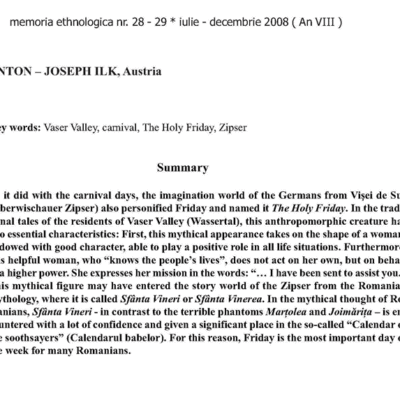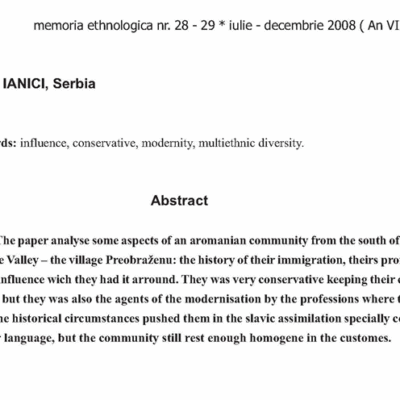Trebuie să fii autentificat pentru a publica o recenzie.
Elemente simbolice în ritualul funerar din Cupşeni (Maramureş)
Symbolic Elements in the Funerary Rituals in Cupşeni
(Maramureş County)
This study is dedicated to an analysis of a few symbolic elements I have identified
within the funerary ritual, which is still enacted in the village Cupşeni, the Maramureş
County. As well as in other areas, the sequencing of the ritual comprises several significant
moments, starting with the separation of the soul from the world of the living, and ending
with its reintegration with the world of the forefathers.
The magic-ritualistic inventory is much focussed on, which can be identified in the
coffin, beside the corpse, and noticing that all the objects that are signalled to appear there
are seven: seven threads of cotton that are necessary for the realization of the light of the
body, seven “corners” of the ritualistic bread, seven coins, seven grains of incense, etc.
Number seven also appears during another ritualistic sequence of the funerary ceremony:
the road from the dead person’s house to the cemetery. On this way they read seven
Evangelic texts, and seven children are give seven special bread loafs which have money inside.
In such a community, as the one in Cupşeni, we can speak about a practice of the
peasant’s Christianity, which is especially performed, as they are less capable of explaining
things in discourse.
As a conclusion, we may state that in order to approach culture through the perspective
of rituals and symbols that are connected to the idea of death, one must design an image
that might function as a real ‘grid’ according to which one might decipher the profound significations
of a civiliazation. In our case, these significations belong to a rural civilization, to
the peasant’s culture.





Recenzii
Nu există recenzii până acum.